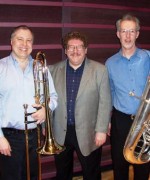Column Name
Title
Cleveland, Ohio, native Eric Ewazen earned a B.M. from the Eastman School of Music and an M.M. and D.M.A. from Juilliard in composition. In addition to Juilliard, where he has taught in the Pre-College Division since 1980 and the College Division since 1982, he has taught at the Hebrew Arts School and Lincoln Center Institute. This summer, the Cleveland Orchestra will play his Ballade for Clarinet, Harp and Percussionconducted by Jahja Ling and featuring principal clarinet Franklin Cohen (both Juilliard alums)at Blossom Music Center.
Body
When did you first know you wanted to be a musician and how did you come to know it?
Having played piano since I was a youngster—and cello in my junior high and high school orchestras, and double bass in the band—I seriously got interested in composing when I was in high school. Writing a rock musical about the Vietnam war called Apocalypse (years before Francis Ford Coppola’s movie!) and being encouraged by my band, chorus, and orchestra teachers at school, I began to love composing. I realized that would be my profession by about 11th grade.
Who was the teacher or mentor who most inspired you when you were growing up and what did you learn from that person?
I was really fortunate to have a wide array of inspiring teachers. My band, chorus, and orchestra directors all found out I was interested in writing—and in Midpark High School in Cleveland, they each encouraged me to write for their ensembles. Those were the pieces I submitted to college.
What was the first recording that you remember hearing or buying? What was its significance to you?
I don’t even remember who was performing on the LP, but on one side was the Grieg Piano Concerto, and on the other side was the Tchaikovsky Piano Concerto—and I listened to that LP endlessly. My parents were not musicians and we didn’t have a lot of classical records when I was growing up, but the few we did have, became well-worn!
What’s the most embarrassing moment you’ve had as a performer?
So many stories! Flying all the way up to Vermont to rehearse my chamber piece for two pianos, percussion, and voice with Mary Anthony Cox and Rebecca Scott, and realizing I had left the music back in New York. Accompanying a brand-new tuba and piano sonata by Jay Krush (composer and tubist with Chestnut Brass Ensemble) and having just received a brand-new photocopy of the score, finding out as I was performing that some of the even-numbered pages did not copy out, prompting some major improvisation on my part! Playing the Bartok Sonata, getting lost in the second movement, and skipping right to the end of that movement, turning a four-minute movement into a 40-second one. Conducting my solemn Hymn for the Lost and the Living and falling on all fours as I climbed onto the podium right before the concert began. There’s more! I think there’s a reason I’m primarily a composer and not a performer!
If you could have your students visit any place in the world, where would it be, and why?
I attended the International Trumpet Convention in Bangkok, Thailand, in 2005. While there, I visited the temples of Angkor Wat in Cambodia. The images will remain with me as long as I live. The architecture is sublime, perfect, monumental. I heard Cambodian musicians play traditional music near one of the temples—and they found out I was a musician and let me join in on a marimba-type instrument. There we were, from opposite sides of the world, opposite life experiences, but we connected as musicians, trying to bring beauty into this world. It was a profound experience for me.
What are your non-music related interests or hobbies?
I enjoy travel and photography.
If your students could only remember one thing from your teaching, what would you want it to be?
I want to convey the sheer joy of being a musician. Being an L&M teacher, I deal with the analytical—but even that can be a joyful discovery! When they perform, I would hope they would perform with informed ears, fully knowing the structure, the background, and the aesthetic of the music.
What CD are you listening to?
I’ve been listening to the National Symphony Orchestra recording of Schwantner’s music, which includes his brilliant Percussion Concerto played by Evelyn Glennie. I will be writing a concerto for Ms. Glennie, and I am listening to all the amazing recordings she has made.
If you weren’t in the career you are in, what would you be doing?
I was very interested in astronomy (until I found out that you had to have such a big background in math—not my strongest subject!).





